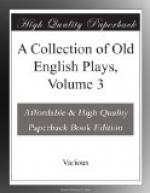[Exe.
FINIS. [Greek: Telos]
Terminat hora diem, terminat Author opus.
Nella [Greek: ph d ph n r] la B.[107]
INTRODUCTION TO THE HISTORY OF THE TRYALL OF CHEVALRY.
This play was printed in 1605, and is stated on the title-page to have been “lately acted by the right Honorable the Earle of Darby his servants.” It has not been reprinted, and copies of the old quarto are exceedingly rare. There is an air of old-fashionedness about the diction and the metre that would lead us to suppose the play was written several years before the date of publication. The wearisome practice, in which the characters so freely indulge, of speaking in the third person is very characteristic of the earlier dramatists, notably of Greene. Yet it is clear, from more than one passage, that the author was acquainted with Shakespeare’s historical plays. Dick Bowyer’s puns on the sentinels’ names (ii. 1) were certainly suggested by Falstaff’s pleasantries with the recruits in Henry IV., Part II. Winstanley absurdly ascribes the piece to William Wager, who flourished (?) when Shakespeare was a child. If I were obliged to make a guess at the authorship, I would name Chettle or Munday, or both. It is not altogether improbable that the Tryall of Chevalry may be the play by Chettle and Wentworth Smith, entitled Love Parts Friendship, acted in 1602[108]. Bourbon and Rodorick are just such a pair of villains as young Playnsey and Sir Robert Westford in Chettle and Day’s Blind Beggar. The low comedy in both pieces might well have come from the same hand, though Dick Bowyer is certainly more amusing than the roystering companions in the Blind Beggar.
I make no claim for high excellence on behalf of this unknown playwright. The writing is at times thin and feeble, and the versification is somewhat monotonous. But with all its faults, the language is dramatic. The writer was a contemporary of Shakespeare, and something of Shakespeare’s spirit breathes through the pages of this forgotten play. Take such a speech as the following, from the second scene of the opening act:—
Must I be spokesman? Pembrooke plead for love? Whose tounge tuned to the Instruments of war Never knew straine of fancy; on my breath Affection never dwelt, but war and death! But if thou lov’dst to have thy soldiers fight, Or hearten the spent courages of men, Pembrooke could use a stile invincible. Lov’dst thou a towne, Ide teach thee how to woo her With words of thunder-bullets wrapt in fire,[109] Till with thy cannon battry she relent And humble her proud heart to stoop to thee. Or if not this, then mount thee on a steed Whose courage never awde an yron Bit, And thou shalt heare me hollow to the beast And with commanding accents master him. This courtship Pembrooke knows, but idle love, The sick-fac’t object of an amorous brayne, Did




